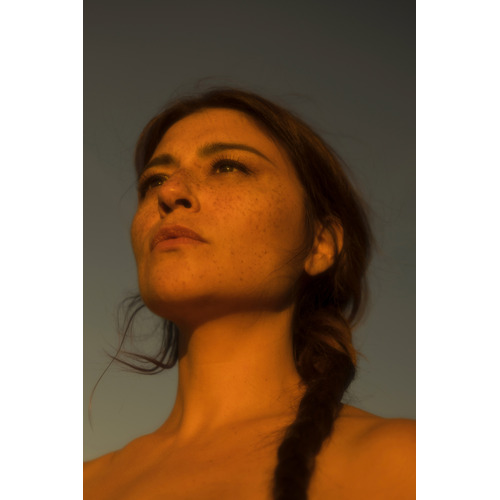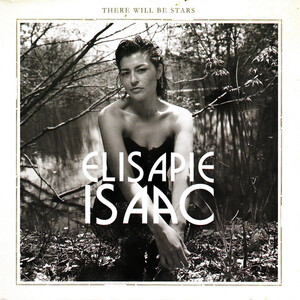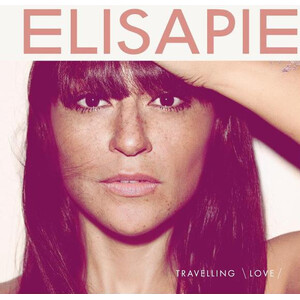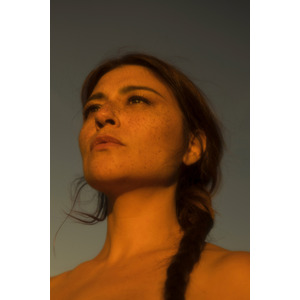Elisapie (ᐃᓕᓴᐱ)
Websites:
https://www.bonsound.com/fr/artiste/elisapie/, https://www.elisapie.com/, https://www.thecanadianencyclopedia.ca/en/article/elisapie-isaac
Origin:
Salluit, Québec, 🇨🇦
Biography:
Elisapie Isaac (a.k.a. Elisapie or ᐃᓕᓴᐱ in Inuktitut syllabics), singer, musician, songwriter, documentary filmmaker, writer, director, actor, broadcaster (born 1977 in Salluit, QC). Elisapie is an Inuit singer/songwriter and actor who has been professionally active since the early 2000s. She has won numerous awards for her artistic endeavors. She sings in French, English and Inuktitut.
Early Life & Education
Elisapie was born and raised in Salluit, the second-northernmost community in Quebec. Salluit is in the Nunavik region of the province. Her mother is Inuk and her father is from Newfoundland. Elisapie was adopted at birth by Inuit relatives as suggested by her grandmother. She became that family’s eldest daughter. Her biological mother lived in the same village as her when she was young. When Elisapie was a preteen, she met her biological father. During her youth, winters were habitually spent in the village of Salluit. Summers were spent in camps with family members. She comes from a musical family. Her uncle George Kakayuk was in a popular Inuit rock band called Sugluk, also known as Salluit Band. Elisapie performed with them when she was young. As a child, at the suggestion of her adoptive mother, she would call in to the local radio station to sing over the air. In 1999, Elisapie moved to Montreal to study communications at CEGEP John Abbott College.
Career
Elisapie’s first original artistic endeavour was a documentary film. Dedicated to her grandfather, Sila piqujipat / Si le temps le permet / If the Weather Permits is a trilingual (Inuktitut/French/English) documentary that focuses on life in the community of Kangirsujuaq, an Inuit village in the far north of Quebec. The film explores issues of tradition and modernity in a remote Inuit community. It contrasts Inuit youth who absorb culture imported from Southern Canada with the “living off the land” culture of the community Elders. The film won the Prix Jutra (now Prix Iris), a prestigious Quebec cinema award, that year. It won numerous other awards and honours.
Elisapie met multi-instrumentalist Alain Auger in Montreal in July 2000. They were immediately impressed by each other’s musical talents. They set to work collaborating. Their first effort was a self-titled album that won the 2005 Juno Award for Aboriginal Recording of the Year. Taima is an Inuktitut word that can be translated as “Enough! It’s over. Let’s move on.” Taima was well received upon its release. It blended a wide variety of musical styles, including jazz, new age, rock and pop. Moreover, the album was successful in Canada, as well as internationally.
In 2006, Elisapie wrote lyrics for music composed by French conductor Bruno Coulais. The music was created for the National Film Board of Canada documentary The White Planet, a film about wildlife in the Arctic. Elisapie sang on the soundtrack for the movie.
Elisapie has since released several more albums, including There Will Be Stars (2009), Travelling Love (2012) and The Ballad of the Runaway Girl (2018). The Ballad of the Runaway Girl was nominated for both the Indigenous Music Album of the Year Juno Award as well as a Polaris Prize in 2019. The same album won two 2019 Félix Awards and a 2019 Gamiq Award for Folk Album. In 2023, she released an Inuktitut version of the song Heart of Glass, originally recorded by the American punk rock group Blondie in 1979. Elisapie lists Blondie, Neil Young, Bob Dylan, Leonard Cohen and Led Zeppelin as major influences. These staples of classic rock also inspired her uncle George.
Elisapie was erroneously nominated for the 2013 breakthrough artist of the year Juno. Because she had already won a Juno in 2005 as part of Taima, she was ineligible to be nominated for a “breakthrough” Juno eight years later.
Also in 2013, Elisapie provided her voice — both in a speaking role and in a singing role — to both the English and French versions of the film The Legend of Sarila. Elisapie played the role of Sedna (see The Goddess of the Sea: The Story of Sedna). She also has a voice-acting credit as Miali in the 2020 animated film Soul.
In addition to her voice-acting credits, she has appeared in film and television. Her credits include an ailing Inuit woman in the 2008 film Ce qu'il faut pour vivre, as a participant in the television program Building the Inuit Homeland, and appearing in five episodes of Motel Paradis, playing the role of Sabrina Bérubé-Caron.
Elisapie also stars in a unique film project as a neuroscientist who develops melophobia — aversion or fear of music — in the film V F C. This film is an arthouse horror movie that is also an augmented reality experience. In V F C, which was filming in 2021 and in post-production in 2023, each viewer has the opportunity to listen to a customized film soundtrack.
Reflecting on the recurring theme of contrasting influences, Elisapie has stated that “…as Inuit, we’re not frightened to mix things up. We have a very eclectic culture; not one that holds us back but rather a culture in transition.”
In 2020, Elisapie won the Félix Award for Indigenous Artist of the Year, for which she was also nominated the year before. That same year, Elisapie also contributed to the television soundtrack for the program Eaux turbulentes, working with Frédéric Levac. Additionally, Elisapie has produced Le Grand Solstice since 2021. This is the first national broadcast television show celebrating National Indigenous Peoples Day.
Personal Life
Elisapie has three children and resides in the Montreal area, though regularly travels home to Nunavik.
Awards & Accolades
Elisapie’s first project, the documentary film Sila piqujipat / Si le temps le permet / If the Weather Permits, won the Rigoberta Menchu Prize at the Montreal First People's Festival in 2003. Her first album, Taima, won the 2005 Juno for Aboriginal Recording of the Year. Her 2018 album, The Ballad of the Runaway Girl, was nominated for the 2019 Juno for Indigenous Music Album of the Year and was also shortlisted for the 2019 Polaris Prize. In 2021, Elisapie was made Compagne des arts et des lettres du Quebec by the Conseil des arts et des lettres du Quebec. In 2023, Elisapie Isaac received an honorary doctorate from Concordia University.
En septembre 2018, Elisapie lançait The Ballad of the Runaway Girl, son premier album en six ans. Cette oeuvre marquante dans la carrière de l’auteure-compositrice-interprète lui valu deux Félix (pour Album de l'année - autres langues et Réalisation de disque de l'année) et un total de cinq nominations à l'ADISQ, une nomination pour le JUNO de l’Album autochtone de l’année, ainsi qu'une place sur la courte liste de l'édition 2019 du Prix Polaris. En plus de l’amener à voyager un peu partout en Amérique du Nord et en Europe, ce nouvel album a obtenu d’excellentes critiques. Tandis que Rolling Stone France l’a qualifiée d’album délicatement violent qui séduit autant qu’il interroge, NPR a affirmé que la chanteuse synthesizes stories from her eventful life with hypnotic arrangements that channel '70s rock, indigenous folk music and the low, moody rumble of barnstormers like Tom Waits. Le 19 juin 2020, Elisapie nous revenait avec un nouvel extrait intitulé Asugguq. Ce titre est un cadeau pour les communautés inuit à l’approche de la Journée nationale des peuples autochtones du Canada.
Ambassadrice de la culture inuit, Elisapie représente la beauté du Grand Nord, un peu sauvage, un peu brute. Son plus récent album, The Ballad of the Runaway Girl est le conte musical d’une inuk expatriée. Elle y aborde des défis personnels rencontrés en tant qu'enfant adoptée, mère et amoureuse. Alors que la chanteuse explore ses racines nordiques et les différentes facettes de sa féminité, on découvre, plus que jamais, une Inuk fière de ses origines qui travaille à la reconnaissance des difficultés historiques de son peuple. Le périple commence dès ses premiers jours avec sa mère biologique qui la donne en adoption sur le tarmac de l’aéroport de Salluit, le village où elle a grandit en rêvant du sud. Puis, vient la fuite vers Montréal. Elle y construit une famille et oublie les conditions extrêmes du Grand-Nord.
Aujourd’hui, déposant un regard plein de tendresse sur son peuple, elle renoue avec ses origines et offre un folk bien habité. Elle se livre, sans détour, racontant son histoire et faisant briller quelques classiques de la culture musicale autochtone. Un retour aux sources, tantôt doux, tantôt cru avec sa façon bien à elle de mélanger l’inuktitut, l’anglais et le français. C’est le projet qui fera découvrir le personnage derrière la musique de son nouvel album.





